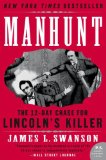Summary | Excerpt | Reading Guide | Reviews | Beyond the Book | Readalikes | Genres & Themes | Author Bio

The 12-Day Chase for Lincoln's Killer
by James L. Swanson
Booth, once inside Ford's, wanted to cross behind the stage all
the way to the other side of the building, where a small door led to a narrow
passageway that ran west to Tenth Street and the front of the theatre. Booth
asked an employee if he could walk across the stage, hidden behind the scenery.
That was impossible, he was told. The "dairy scene," a deep scene that required
the full stage, was on, and there was no room to hide from the audience by
creeping along behind the scenery. Instead, Booth would have to cross under the
stage through a passageway and emerge on the other side.
Booth lifted the trapdoor and dropped below into darkness.
Walking along the hard-packed dirt floor, he could hear the wooden planks of the
stage creaking overhead, and the distant, muffled voices of the actors and
laughter from the audience. He ascended the stairs at the end of the passageway,
nudged open the trapdoor, and entered the passageway that ran lengthwise between
Ford's and the Star Saloon next door.
He walked the length of the building and emerged on Tenth.
Anyone who saw him now would assume he had come down Tenth on foot to take in
the play. No one in the theatre, save a few employees, knew he had a horse
waiting out back. There was time for one last drink.
Booth walked into the Star Saloon at around 10:00 p.m. The
cramped, narrow, dimly lit establishment catered to the actors, stagehands, and
playgoers who frequented Ford's Theatre. Booth was alone. A regular, he nodded
to owner Peter Taltavul and called for his pleasure: whiskey. The bartender
poured him a glass and set the bottle on the counter within Booth's reach.
Water, too, please, Booth reminded him: Taltavul had neglected to serve the
customary companion beverage. Booth's pale, delicate fingers squeezed the glass,
raised it to his lips, and he downed the drink the way a more temperate, thirsty
man might swallow the glass of water. Booth savored the warming spirits. It
might be a while before he could enjoy another one. Any customers who recognized
the handsomest, best-dressed man in Washington kept it to themselves and did not
disturb the famous actor. Booth slapped a few coins on the bar and left without
saying a word. He exited onto Tenth Street, turned to his right, walked a few
paces, and saw the president's carriage still parked on the near side of Tenth
several yards beyond the main door, the coachman and horse waiting to take
Lincoln back home. Burke had gone for a drink after he dropped off the Lincolns
and their guests, and then returned to the coach.
In the alley behind Ford's, Mary Anderson watched John Peanut
walking Booth's impatient horse back and forth. This was it. Booth tarried in
the lobby, soaking in the atmosphere
and listening to the dialogue. He was still on schedule. No need
to rush. Walking to the lobby's north end, he ascended the curving staircase to
the dress circle, following the same path the Lincolns took to their box. Booth
paused at the head of the stairs to take advantage of the best view of the
president's box, a vista that caused him to look slightly down, and diagonally
across the width and length of the house. He walked slowly along the west wall.
James Ferguson, still hoping to witness General Grant's arrival, looked up from
his first-floor seat and saw, on the other side of the theatre, another man - not
Grant - approaching the box. He recognized John Wilkes Booth: "Somewhere near ten
o'clock . . . I saw Booth pass along near the box, and then stop, and lean
against the wall. He stood there a moment."
Booth could see the door that opened to the vestibule that led
directly into the president's box. What he saw - or more accurately what he did
not see - surprised him. The door was unguarded. He expected to find an officer, a
soldier, or at least a civilian policeman seated there. Instead, seated near but
not blocking the door was Lincoln's valet, Charles Forbes, who had ridden to
Ford's atop the coach beside the driver. Booth paused to speak to Forbes,
showing him some kind of card or piece of paper. To this day no one knows what
words they exchanged, or what document Booth displayed. Was it a letter? Or
merely the actor's calling card? A card with Booth's name on it would open
almost any door in Washington. Forbes did not attempt to stop him. Booth
proceeded to the door, realizing that, unless a hidden guard was perched inside
the small vestibule, no one was going to stop him. He seized the knob, turned
it, and pushed open the door. James Ferguson looked up again and watched Booth
enter the box: "I looked back and saw him step down one step, put his hands to
the door, and his knee against it, and push the door open. I did not see any
more of him." Yellow gaslight from the dress circle illuminated the dark
vestibule. Booth peered inside. Empty. There was no guard. No one stood between
him and the president of the United States.
The foregoing is excerpted from Manhunt by James L. Swanson. All rights reserved. No part of this book may be used or reproduced without written permission from HarperCollins Publishers, 10 East 53rd Street, New York, NY 10022
Your guide toexceptional books
BookBrowse seeks out and recommends the best in contemporary fiction and nonfiction—books that not only engage and entertain but also deepen our understanding of ourselves and the world around us.